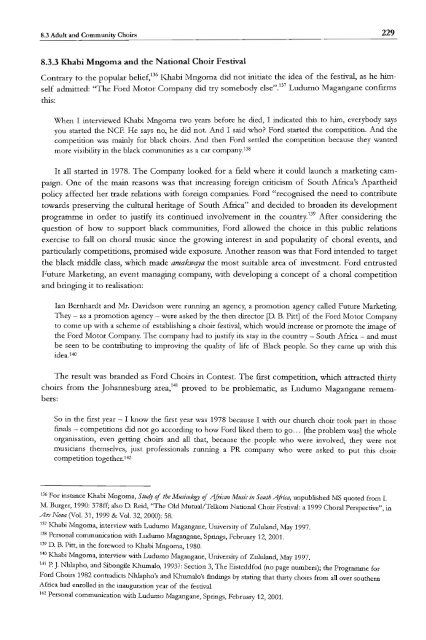South African Choral Music (Amakwaya): Song, Contest and the ...
South African Choral Music (Amakwaya): Song, Contest and the ...
South African Choral Music (Amakwaya): Song, Contest and the ...
You also want an ePaper? Increase the reach of your titles
YUMPU automatically turns print PDFs into web optimized ePapers that Google loves.
8.3 Adult <strong>and</strong> Community Choirs<br />
8.3.3 Khabi Mngoma <strong>and</strong> <strong>the</strong> National Choir Festival<br />
Contrary to <strong>the</strong> popular belief,136 Khabi Mngoma did not initiate <strong>the</strong> idea of <strong>the</strong> festival, as he himself<br />
admitted: "The Ford Motor Company did try somebody else".137 Ludumo Magangane confu:ms<br />
this:<br />
When I interviewed Khabi Mngoma two years before he died, I indicated this to him, everybody says<br />
you started <strong>the</strong> NCE He says no, he did not. And I said who? Ford started <strong>the</strong> competition. And <strong>the</strong><br />
competition was mainly for black choirs. And <strong>the</strong>n Ford settled <strong>the</strong> competition because <strong>the</strong>y wanted<br />
more visibility in <strong>the</strong> black communities as a car company.l38<br />
It all started in 1978. The Company looked for a field where it could launch a marketing campaign.<br />
One of <strong>the</strong> main reasons was that increasing foreign criticism of <strong>South</strong> Africa's Apar<strong>the</strong>id<br />
policy affected her trade relations with foreign companies. Ford "recognised <strong>the</strong> need to contribute<br />
towards preserving <strong>the</strong> cultural heritage of <strong>South</strong> Africa" <strong>and</strong> decided to broaden its development<br />
programme in order to justify its continued involvement in <strong>the</strong> country.139 After considering <strong>the</strong><br />
question of how to support black communities, Ford allowed <strong>the</strong> choice in this public relations<br />
exercise to fall on choral music since <strong>the</strong> growing interest in <strong>and</strong> popularity of choral events, <strong>and</strong><br />
particularly competitions, promised wide exposure. Ano<strong>the</strong>r reason was that Ford intended to target<br />
<strong>the</strong> black middle class, which made amakwqya <strong>the</strong> most suitable area of investment. Ford entrusted<br />
Future Marketing, an event managing company, with developing a concept of a choral competition<br />
<strong>and</strong> bringing it to realisation:<br />
Ian Bernhardt <strong>and</strong> Mr. Davidson were running an agency, a promotion agency called Future Marketing.<br />
They - as a promotion agency - were asked by <strong>the</strong> <strong>the</strong>n director [D. B. Pitt] of <strong>the</strong> Ford Motor Company<br />
to come up with a scheme of establishing a choir festival, which would increase or promote <strong>the</strong> image of<br />
<strong>the</strong> Ford Motor Company. The company had to justify its stay in <strong>the</strong> country - <strong>South</strong> Africa - <strong>and</strong> must<br />
be seen to be contributing to improving <strong>the</strong> quality of life of Black people. So <strong>the</strong>y came up with this<br />
idea. 14O<br />
The result was br<strong>and</strong>ed as Ford Choirs in <strong>Contest</strong>. The first competition, which attracted thirty<br />
choirs from <strong>the</strong> Johannesburg area,141 proved to be problematic, as Ludumo Magangane remembers:<br />
So in <strong>the</strong> first year - I know <strong>the</strong> first year was 1978 because I with our church choir took part in those<br />
finals - competitions did not go according to how Ford liked <strong>the</strong>m to go... [<strong>the</strong> problem was] <strong>the</strong> whole<br />
organisation, even getting choirs <strong>and</strong> all that, because <strong>the</strong> people who were involved, <strong>the</strong>y were not<br />
musicians <strong>the</strong>mselves, just professionals running a PR company who were asked to put this choir<br />
competition toge<strong>the</strong>r.142<br />
136 For instance Khabi Mngoma, Stu4J of <strong>the</strong> <strong>Music</strong>ology of <strong>African</strong> <strong>Music</strong> in <strong>South</strong> Africa, unpublished MS quoted from 1.<br />
M. Burger, 1990: 378ff; also D. Reid, "The Old Mutual/Telkom National Choir Festival: a 1999 <strong>Choral</strong> Perspective", in<br />
Ars Nova (Vo!. 31, 1999 & Vo!. 32, 2000): 58.<br />
137 Khabi Mngoma, interview with Ludumo Magangane, University of Zulul<strong>and</strong>, May 1997.<br />
138 Personal communication with Ludumo Magangane, Springs, February 12, 2001.<br />
139 D. B. Pitt, in <strong>the</strong> foreword to Khabi Mngoma, 1980.<br />
140 Khabi Mngoma, interview with Ludumo Magangane, University of Zulul<strong>and</strong>, May 1997.<br />
141 P. J. Nhlapho, <strong>and</strong> Sibongile Khumalo, 1993?: Section 3, The Eisteddfod (no page numbers); <strong>the</strong> Programme for<br />
Ford Choirs 1982 contradicts Nhlapho's <strong>and</strong> Khumalo's findings by stating that thirty choirs from all over sou<strong>the</strong>rn<br />
Africa had enrolled in <strong>the</strong> inauguration year of <strong>the</strong> festival.<br />
142 Personal communication with Ludumo Magangane, Springs, February 12, 2001.<br />
229

















